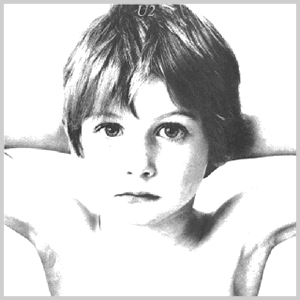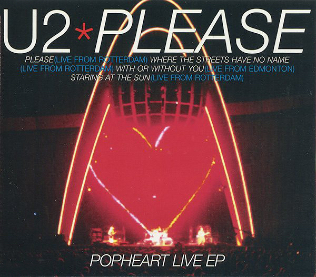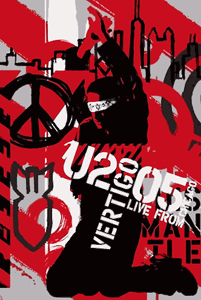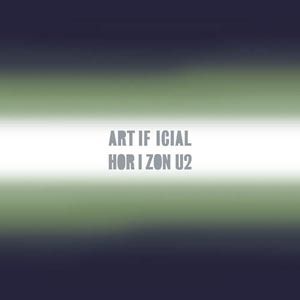Related Research Articles

U2 are an Irish rock band from Dublin, formed in 1976. The group consists of Bono, the Edge, Adam Clayton, and Larry Mullen Jr.. Initially rooted in post-punk, U2's musical style has evolved throughout their career, yet has maintained an anthemic quality built on Bono's expressive vocals and the Edge's chiming, effects-based guitar sounds. Their lyrics, often embellished with spiritual imagery, focus on personal and sociopolitical themes. Popular for their live performances, the group have staged several ambitious and elaborate tours over their career.

Boy is the debut studio album by Irish rock band U2. It was released on 20 October 1980 by Island Records and was produced by Steve Lillywhite. Boy contains songs from the band's 40-song repertoire at the time, including two tracks that were re-recorded from their original versions on the group's debut release, the EP Three.

October is the second studio album by Irish rock band U2. It was released on 12 October 1981 by Island Records, and was produced by Steve Lillywhite. The album was lyrically inspired by the memberships of Bono, the Edge, and Larry Mullen Jr. in a Christian group called the Shalom Fellowship, and consequently it contains spiritual and religious themes. Their involvement with Shalom Fellowship led them to question the relationship between the Christian faith and the "rock and roll" lifestyle, and threatened to break up the band.

Three, also known as U2 3, is the debut release by Irish rock band U2. It was released in Ireland on 26 September 1979 through the CBS Ireland record label.

Please: PopHeart Live EP is a live EP by the Irish rock band U2. The EP features four live tracks from the band's PopMart Tour and was released towards end of the second leg of the tour on 8 and 9 September 1997. Two of four the songs on the release were from the band's most recent album at the time, Pop (1997) and the other two were from The Joshua Tree (1987). This release was U2's first EP since Wide Awake in America (1985).

"Where the Streets Have No Name" is a song by Irish rock band U2. It is the opening track from their 1987 album The Joshua Tree and was released as the album's third single in August 1987. The song's hook is a repeating guitar arpeggio using a delay effect, played during the song's introduction and again at the end. Lead vocalist Bono wrote the lyrics in response to the notion that it is possible to identify a person's religion and income based on the street on which they lived, particularly in Belfast. During the band's difficulties recording the song, producer Brian Eno considered erasing the song's tapes to have them start from scratch.

"Vertigo" is a song by Irish rock band U2. It is the opening track on their eleventh studio album, How to Dismantle an Atomic Bomb (2004). It was released to radio as the album's lead single on 8 November 2004, and upon release, it received extensive airplay. The song was an international success, bolstered by its usage in a television advertisement featuring the band for Apple's iPod digital music player. The song lent its name to the band's 2005–2006 Vertigo Tour.

"City of Blinding Lights" is a song by Irish rock band U2. It is the fifth track on their eleventh studio album, How to Dismantle an Atomic Bomb (2004), and was released as the album's fourth single on 6 June 2005. It was produced by Flood, with additional production by Chris Thomas and Jacknife Lee. The song reached number one in Spain, and peaked in the top ten in Canada, Ireland, the United Kingdom, and several other countries. The music video was shot at the General Motors Place in Vancouver, British Columbia, Canada.

"Sweetest Thing" is a song by Irish rock band U2. It was originally released as a B-side on the "Where the Streets Have No Name" single in 1987. The song was later re-recorded and re-released as a single in October 1998 for the band's compilation album The Best of 1980–1990.

"The Fly" is a song by Irish rock band U2. It is the seventh track from their 1991 album, Achtung Baby, and it was released as the album's first single on 21 October 1991. "The Fly" introduced a more abrasive-sounding U2, as the song featured danceable hip-hop beats, industrial textures, distorted vocals, and an elaborate guitar solo. Lead vocalist Bono described the song as "the sound of four men chopping down The Joshua Tree", due to its departure from the traditional sound that had characterised the band in the 1980s.

"40", also known as "40 ", is a song by Irish rock band U2. It is the tenth and final track on their 1983 album, War. The song is noted for its live performances; guitarist the Edge and bassist Adam Clayton trade instruments during performances of it, and as it was commonly played to end their concerts, the band would leave the stage one-by-one as the audience continued to sing the refrain "How long to sing this song?". The lyrics are a modification of the Bible's Psalm 40.

Vertigo 2005: Live from Chicago is a concert film by Irish rock band U2. It was filmed from 9–10 May 2005 at the United Center in Chicago, Illinois, during the band's Vertigo Tour. The film was released on DVD later that year on 14 November through Island Records in most parts of the world, and on 15 November through Interscope Records in the United States. The DVD was released as a one-disc standard edition and a deluxe edition with a second disc featuring bonus material and a documentary. It was the first of three concert films from the tour.
"Bad" is a song by Irish rock band U2 and the seventh track on their 1984 album, The Unforgettable Fire. Thematically, the song is about heroin addiction, though lead vocalist Bono has given varying accounts of who was the inspiration behind his lyrics. "Bad" is considered a fan favourite and is one of U2's most frequently performed songs in concert. The band's 12-minute performance of the song at the Live Aid charity concert in 1985 was a breakthrough moment for them.
"The Hands That Built America" is a song by Irish rock band U2. It was released on the soundtrack to the film Gangs of New York, and was one of two new songs on the group's The Best of 1990–2000 compilation. It was nominated for Best Original Song at the 75th Academy Awards, but lost to Eminem's "Lose Yourself".
"The Electric Co." or "Cry/The Electric Co." is a song by Irish rock band U2, and is the tenth track on their debut album Boy, released in 1980.
"In a Little While" is a song by Irish rock band U2 and the sixth track on their 2000 album All That You Can't Leave Behind.
This is a timeline of the history of rock band U2:

Artificial Horizon is a compilation album of remixed tracks by rock band U2. It was released exclusively to subscribing members of U2.com, replacing Medium, Rare & Remastered. The remix CD is of a similar vein to the band's 1995 release Melon: Remixes for Propaganda, which was also released exclusively to fans. A triple-vinyl edition was released to the general public until 14 May 2010; this version included an MP3 for the Snow Patrol remix of the song "Unknown Caller".
"Daddy's Gonna Pay for Your Crashed Car" is a song by Irish rock band U2 and the sixth track from their 1993 studio album Zooropa.
References
- ↑ "Boy". U2 Wanderer. U2 Discography. Archived from the original on 14 May 2007. Retrieved 2007-05-17.
- ↑ Sweetest Thing (Media notes). U2. United Kingdom: Island Records. 1998. back cover. CID727 / 572 466-2.
{{cite AV media notes}}: CS1 maint: others in cite AV media (notes) (link) - 1 2 3 4 5 Stokes, N. (2005). Into the Heart. Da Capo Press. pp. 12–13. ISBN 978-1-56025-765-3.
- ↑ O'Riordan, Rocky (interviewer) (26 November 2020). Boy: The 40th Anniversary Special (Radio broadcast). U2 X-Radio: Sirius XM.
- ↑ "An Cat Dubh to Moment of Surrender" . U2.com. Live Nation. 5 October 2010. Retrieved 5 October 2010.